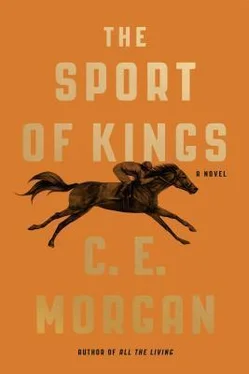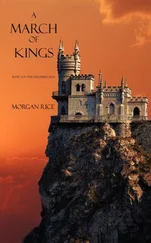She practically leaped away from the edge, stumbling back into a headwind toward the farmhouse, where the man was waiting for her in only a pair of orange bulldog boxers, each of his limbs trying to wrap around another limb for warmth. His eyes were half-lidded against the risen sun, his hair long down his back. He held a cup of coffee in his hand.
He said, “My grandmother had a horse once that ran itself off that cliff … She said it was in love with a cow. They sent the cow off for butchering, and the horse was so … upset, I guess, it ran itself off the cliff. Or at least that’s what my grandmother said.”
“Where am I?” she said.
“Jackson County.”
She made an irritated face.
“Big Hill,” he said. “Go out to the right and drive down Big Hill, and you’ll be in Madison County, and you just follow 421 up to Richmond and catch the bypass to 75.”
She gasped and turned once again toward the cow pond and the cliff’s edge that she had just left. “We’re in Big Hill? Where Daniel Boone…?”
“Yeah,” he said. “This was it. Sight of the promised land … last hurrah of the mountains.”
“My forefather walked this,” she said urgently, unable to turn her eyes from the view of the knobs and expansion of the Bluegrass out of the Wilderness Road. This view was the original splendor, the boundless promise, that thing left alone. Only the sky was more singular.
“Samuel Forge walked this,” she said. “My great-great-great-great-great-great-grandfather.”
“Yeah, yeah,” Penn said, looking at her curiously. “I recognize that name.”
* * *
In Lavinia’s last days, when the cancer in her breast had reduced her muscles to rope and her mind to ash, she was too weak to raise her hands. She could say nothing, only lie there, looking hugely at the ceiling with bone-dry eyes. Henry sat by her side day after day with her foundling hands in his, and it seemed to him that the whittled contours of her once elastic face were begging for something — Henry thought forgiveness, but in actuality relief. But soon, vacancy took up occupancy in those forever features. Her feet grew icy at the toes, the instep, the heel. Her cheeks and lips were packed with lead. Her son touched her brow, unable to look away from the horrifying inevitable. Again and again, he signed to her, but little darknesses intruded like the flickering in a silent film, until finally her lids fell and would not raise up again when she wished to see her son one last time. There was total dark. She died with her lips parted and her brow creased as if she had been expecting something more.
And of all the minutiae of his younger life, that is what he remembered most. His mother had died looking not at him, her son, her accomplishment, but into the well of herself at something. And that something was emptiness. He had felt its sucking draw. And felt it now.
Where in the hell was his daughter? He was flying out to Saratoga with Mack in two hours and he needed her to conduct interviews in his stead. But she hadn’t come home, and here he was panicking like an orphaned child.
And then she was there, his dear, duplicitous mother, his first love — no, Henrietta, his troublesome, guileful girl, padding in on the balls of her feet as if she wouldn’t be detected at nine thirty in the morning, as if she hadn’t been missed, as if she wasn’t one-half of his own damn self.
The cool air of morning accompanied her, and it was a good thing. His insides were like kindling threatening to ignite. Any number of battles were lost by the man who lost his cool.
His voice was level when he said “Henrietta.” She whirled with a gasp, took in the sight of her father in the disheveled clothes of yesterday, his face marred by a complicated fatigue. His graying hair fell forward into awful eyes, where tiny bright roads of blood traveled the curves of his sclera.
“Where were you?”
“I was alone,” she said abruptly.
A warning: “Henrietta, you can’t just hell around…”
“A-lone!” she snapped as two words, and then raised a hand to her own lips as if startled by their rebellion. After coming atop last night’s man, after teetering at the edge of the allowable world and staring down its heights, something had changed. The old poets knew all along: the wilderness has an awful tongue, which teaches doubt.
Henry just smiled down at her, trying to appear easy and loose, though his shaking hands belied his calm. He said, “My little Ruffian, all alone in the big, bad world.” He smiled tightly. “Are you too old for one last lesson?”
God! Was there really no escape? She looked up toward the ceiling as if perceiving many people through those storied floors, the Forge quorum pacing, observing, advising, alive. They were as real as scars on old wood. With a sigh, she said, “Sure, Daddy.” But her mind asked, Am I not a grown woman?
Lesson
You aren’t like them, my little Ruffian. You’d like to think you can find real companions out there, but you can’t. You’d like to think you can discover a mate, but you can’t do that either. You imagine you’ll be understood by people less intelligent than you are, because you don’t actually believe they’re less intelligent, but they are and, believe me, they don’t understand you; they’re incapable. Gold attracts gold. A natural aristocracy exists.
You should be proud of your position. Do you think history was actually made by ordinary men? History is made by the highly particularized, the ones who are intractable, stubborn, relentless. Men who are willing to become something other than their fathers. Yes, I know you’re a woman, but you’re a man in mind. They are the ones willing to risk everything, even their own sanity, maybe necessarily their own sanity, to achieve greatness, and greatness is absolutely and always contingent upon individuality. Are you listening?
I don’t know where you go, with whom you spend your time, and it doesn’t matter. What matters is that you understand that this notion of community life — this ridiculous, sentimentalized idea of a commonwealth, whatever you want to call it — is bankrupt. The ugly truth is that, despite the philosophical spoutings of a few founding fathers, men aren’t created equal, not even close. So a community of equals isn’t possible. A good sentence meant more to Jefferson than the truth. That’s the definition of an aesthete!
Ask yourself this: How many kinds of genius are there in the world? I’ll tell you: two. The first assimilates, because it lacks the willpower to stand on its own in isolation. It understands that the world will spare exceptional people, but only if they feign normalcy, live unremarkable lives, and don’t threaten anyone with their difference. Of course, most of the time the masses have no idea they’re even being condescended to; they’re so ignorant, they don’t even recognize genius when it’s in their midst. The second kind of genius understands all of this, but is so extreme in its unique intelligence that it couldn’t assimilate even if it wanted to. It’s a born outlier. An individual is not necessarily a genius, but every genius is an individual.
If you remember nothing else I ever tell you, remember this: you must be completely yourself in order to achieve greatness, but you may have to lose yourself entirely in the process. That’s the paradox I’m willing to endure not just for my ideals, but for you.
For Henry so loved the horse that he gave his only begotten daughter, so that whosoever believeth in perfection shall have everlasting life, which is fame among men.
Fine. Go ahead and laugh. But do you understand me when I say that the community will offer you comfort and friendship, but in turn you have to give the community your very life?
Читать дальше
Конец ознакомительного отрывка
Купить книгу












